BORIS Johnson announced tonight that millions of Brits would get their second jabs sooner – over India variant fears.
The PM announced the gap between first and second jabs would be slashed to eight weeks after cases of the new Covid strain more than doubled in the last week – but he insisted his roadmap is still on track.
Read our coronavirus live blog for the latest updates
He admitted that the race between the vaccine programme and the virus was about to get tighter.
And today he’s taken swift action to get more second doses in people’s arms quicker, so they are even more protected against Covid.
Currently there’s a 12-week gap between first and second jabs, because studies have shown it generates more antibodies overall, but this will now be cut to eight.
He said tonight: “We will accelerate remaining second doses, especially for the clinically vulnerable, right across the country, to just eight weeks after the first date.
“And if you are in this group the NHS, will be in touch with you. We will also prioritise first jabs for anyone eligible who has not yet come forward.”
Earlier this week the PM refused to rule out the possibility that the final stage of the roadmap on June 21 may have to be delayed.
But tonight he assured people in England that the unlocking on Monday would happen as planned, meaning holidays and indoor mixing is finally allowed again.
However, he warned the nation to continue to be cautious, and for anyone worried to get tested as soon as possible.
He added: “This new variant could make it more difficult to move to step 4 in June.
“I urge everyone to exercise the greatest caution.”
Thankfully he said there was “no evidence of increased cases” which would translate into unmanageable pressure on the NHS.
He also noted that scientists are hopeful that the vaccines are working on the India variant.
Meanwhile, he revealed that the army would be brought in to help in Bolton, to clamp down on a surge in cases, and vaccine sites will be kept open even longer too.
Extra surge testing will be put to the area to try and find as many cases of the new variant as possible.
He said the evidence so far shows that the new variant is spreading more quickly – but it’s not yet clear how much.
And he urged everyone if they were seeing loved ones to “think really carefully” about getting close to them.
It comes as:
- Four people have now died from the Indian variant, PHE said earlier
- Experts warned that the Indian variant could be up to 60 per cent more transmissible than the Kent strain
- New variants pose a ‘lethal danger’ and could spark the worst Covid wave yet, Boris Johnson warned
- Ministers rule out local lockdowns to crack down on Covid hotspots
Earlier one of Boris’ lieutenants insisted No 10 will take “whatever action” is necessary either “regionally or nationally” to squash the outbreak.
Vaccines minister Nadhim Zahawi said “we rule nothing out” in terms of reorganising the jabs rollout or even reimposing lockdowns.
But he insisted the lesson from the last year is that mass testing and isolation is the best way to get pockets of infection under control.
Indian variant cases have more than doubled in the space of seven days from 520 last week to 1,313 this, sparking alarm in Whitehall.
More than 800,000 tests have been sent into the worst affected areas which include Bolton, Formby, and parts of London.
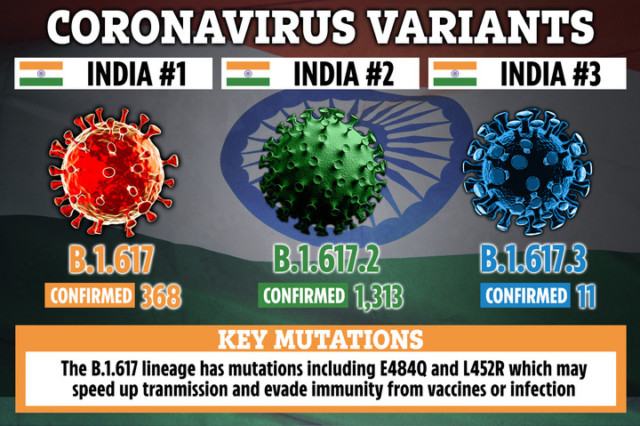
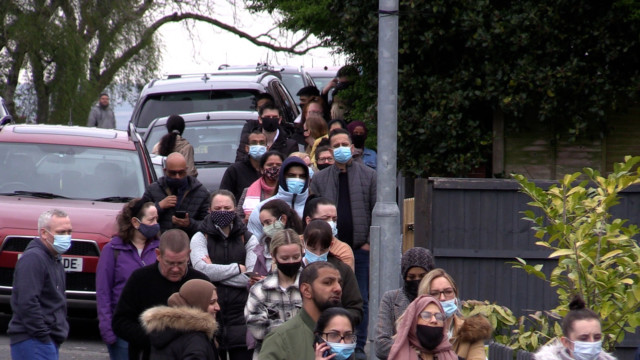
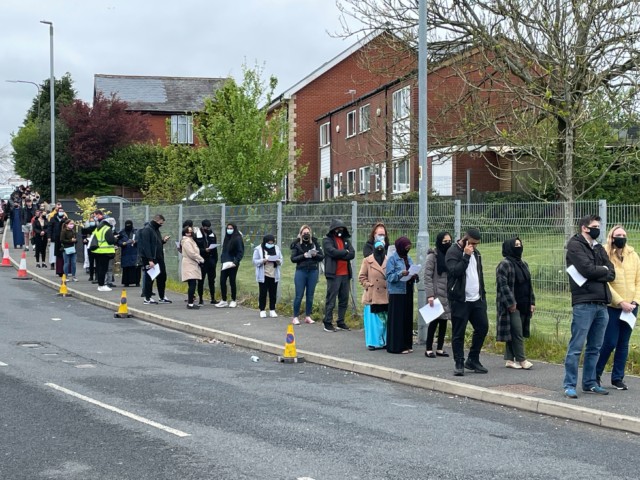
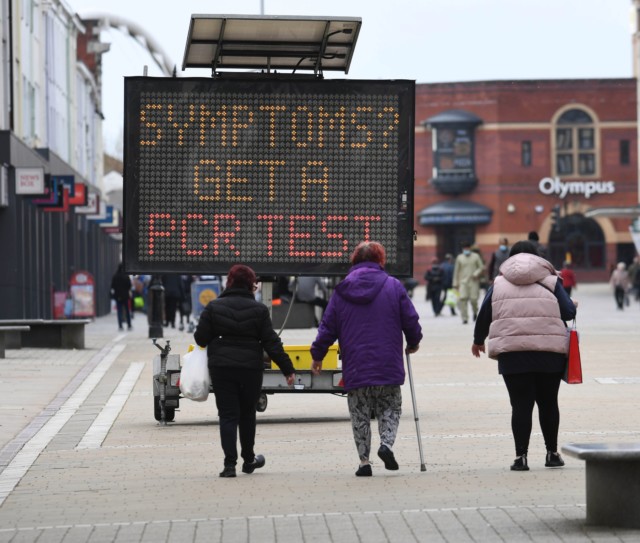
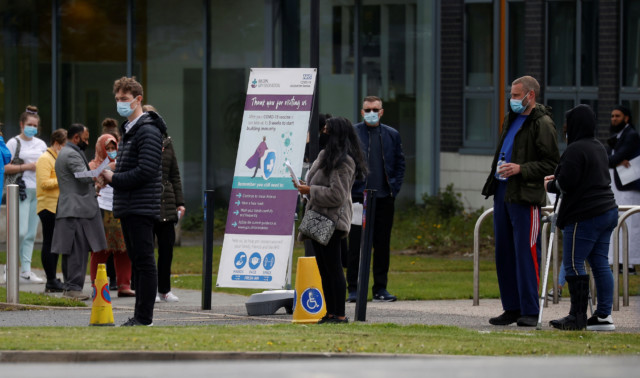
Asked if local lockdowns could be reimposed, Mr Zahawi said: “We rule nothing out in terms of whatever action we need to take regionally or nationally.
“We will rule nothing out to make sure we bear down on this virus and get our lives back according to the roadmap.”
He added one option is “flexing” the vaccine rollout to deliver extra jabs to the worst affected parts of the country.
Ministers are looking at the possibility of vaccinating whole intergenerational households in those areas regardless of age.
Another possibility is speeding up the delivery of second doses to give more people a greater level of protection.
The PM has said the Government “will not hesitate” to act as “we want to make sure we take all the cautious steps now that we could take.”
But on a day of mixed messages a senior Cabinet minister insisted last night that he’s confident the June 21 unlocking will go ahead as planned.
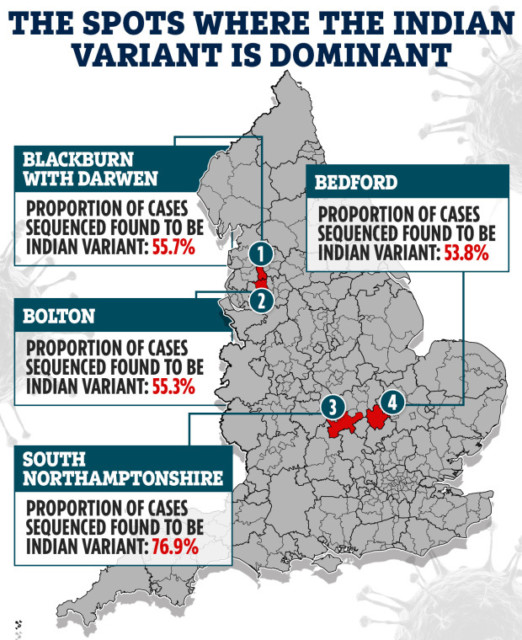
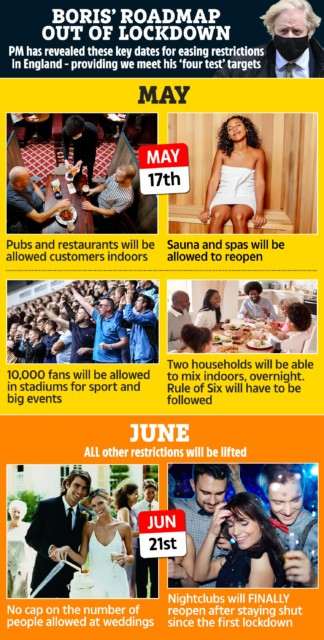
Culture secretary Oliver Dowden said the probability of fully reopening venues is now “much higher” than it was when the roadmap was first drawn up.
He told MPs yesterday: “We are completely on track at the moment with the roadmap and the vaccination is rolling out as planned.
“I have a single-minded determination to get full reopening from June 21. With every passing day I get more confident that we can achieve that.
“There will have to be in the highest risk areas some kind of mitigations required.
“I cannot give the full assurance until we get to the stage of announcing stage four.”
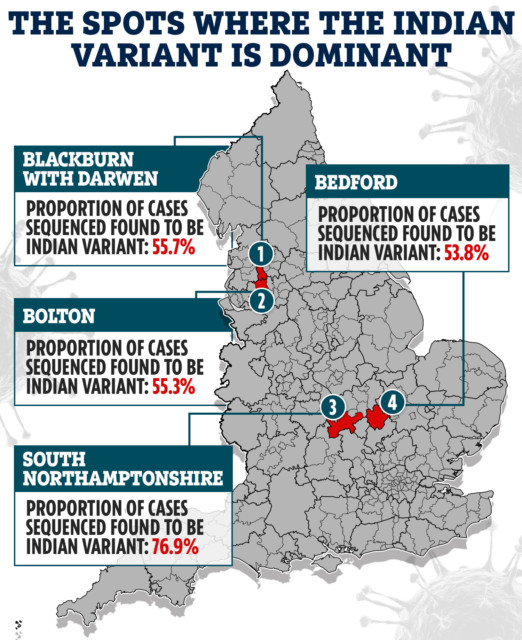
Saturday’s FA Cup final between Chelsea and Leicester City is expected to have 21,000 fans at Wembley.
He added: “The outstanding issue at this stage is the extent to which there will be COVID certification in high-risk venues.
“We are currently working through exactly the threshold for that.”
Ministers and top scientists have moved to reassure Brits that there is currently “no evidence” the Indian variant gets around vaccines.
Mr Zahawi said: “Vaccine effectiveness remains in place, that’s a big tick.
“It’s more infectious but at the moment we have no evidence that it’s more severe in terms of its impact on the human body or on hospitalisation.
“And there’s no evidence the vaccines don’t work against it. That’s the good news.”
Nick Loman, a professor of microbial genomics at Birmingham University, said he’s “feeling quite good about the vaccine” when it comes to combatting it.
And Hugh Pennington, professor of bacteriology at Aberdeen, added: “I don’t think we should be particularly concerned.
“There’s no strong evidence that it’s nastier, that if you catch it you have a greater chance of going into hospital or into the ICU.
“And there’s no really strong evidence that they get round the vaccine immunity either.
“It does seem to be getting about quite well in certain parts of the country but that’s been the case with this virus anyway. It’s a very transmissible virus.
“I don’t see any particular reason why we should be more worried about these variants, the ones we’ve seen so far, because the most important thing is none of them seem to escape the immunity we get from the vaccine.”








